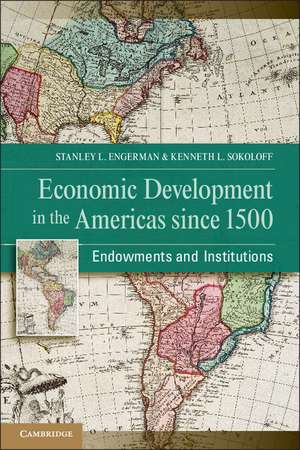Economic Development in the Americas since 1500: Endowments and Institutions
Autor Stanley L. Engerman, Kenneth L. Sokoloff Contribuţii de Stephen Haber, Elisa V. Mariscal, Eric M. Zolten Limba Engleză Hardback – 13 noi 2011
| Toate formatele și edițiile | Preț | Express |
|---|---|---|
| Paperback (1) | 313.38 lei 3-5 săpt. | |
| Cambridge University Press – 13 noi 2011 | 313.38 lei 3-5 săpt. | |
| Hardback (1) | 646.12 lei 6-8 săpt. | |
| Cambridge University Press – 13 noi 2011 | 646.12 lei 6-8 săpt. |
Preț: 646.12 lei
Preț vechi: 725.97 lei
-11% Nou
Puncte Express: 969
Preț estimativ în valută:
123.63€ • 134.72$ • 104.18£
123.63€ • 134.72$ • 104.18£
Carte tipărită la comandă
Livrare economică 23 aprilie-07 mai
Preluare comenzi: 021 569.72.76
Specificații
ISBN-13: 9781107009554
ISBN-10: 1107009553
Pagini: 444
Ilustrații: 4 b/w illus. 60 tables
Dimensiuni: 155 x 235 x 25 mm
Greutate: 0.73 kg
Ediția:New.
Editura: Cambridge University Press
Colecția Cambridge University Press
Locul publicării:New York, United States
ISBN-10: 1107009553
Pagini: 444
Ilustrații: 4 b/w illus. 60 tables
Dimensiuni: 155 x 235 x 25 mm
Greutate: 0.73 kg
Ediția:New.
Editura: Cambridge University Press
Colecția Cambridge University Press
Locul publicării:New York, United States
Cuprins
Beginnings: memoirs by two of Ken Sokoloff's friends and teachers Claudia Goldin and Stanley L. Engerman; Acknowledgments; Seminar presentations; Sources of funding; List of tables; List of figures; Introduction; 1. Paths of development: an overview; 2. Factor endowments and institutions with Stephen Haber; 3. The role of institutions in shaping factor; 4. The evolution of suffrage institutions; 5. The evolution of schooling: 1800–1925 with Elisa V. Mariscal; 6. Inequality and the evolution of taxation Kenneth L. Sokoloff and Eric M. Zolt; 7. Land and immigration policies; 8. Politics and banking systems Stephen Haber; 9. Five hundred years of European colonization; 10. Institutional and non-institutional explanations; 11 Epilogue: institutions in political and economic development; Bibliography; Prior publications.
Recenzii
'This volume is both a magisterial and a profound reassessment of the role of institutions in the social, political, and economic evolution of the Americas from Columbian contact to the present. There is nothing in the literature that approaches the range and detail of the cross-country comparisons across the Americas offered by Engerman and Sokoloff and their coauthors. The broad conclusions have enormous implications for understanding the development paths of societies everywhere.' David Eltis, Robert W. Woodruff Professor of History, Emory University
'On the big question of why some countries are rich and others poor, I find myself coming back again and again to the argument at the heart of this book. Although Engerman and Sokoloff formulate it in simple terms, it is anything but simple. On the contrary, it opens up a wealth of deep ideas about the mechanisms elites use to sustain themselves in power and how these mechanisms then inhibit economic development.' Naomi R. Lamoreaux, Yale University
'The work of Engerman and Sokoloff is foundational to the literature on colonialism, institutions, and economic development and anyone interested in development or new institutional economics will need to read this book.' Tomas Nonnenmacher, EH.net
'On the big question of why some countries are rich and others poor, I find myself coming back again and again to the argument at the heart of this book. Although Engerman and Sokoloff formulate it in simple terms, it is anything but simple. On the contrary, it opens up a wealth of deep ideas about the mechanisms elites use to sustain themselves in power and how these mechanisms then inhibit economic development.' Naomi R. Lamoreaux, Yale University
'The work of Engerman and Sokoloff is foundational to the literature on colonialism, institutions, and economic development and anyone interested in development or new institutional economics will need to read this book.' Tomas Nonnenmacher, EH.net
Notă biografică
Descriere
Examines differences in the rates of economic growth in Latin America and mainland North America since the seventeenth century.














